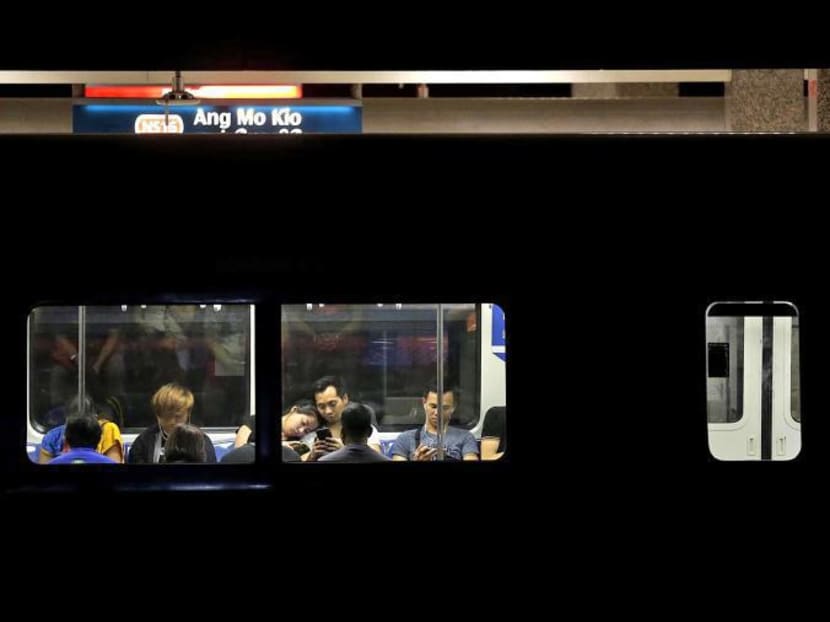To carry out maintenance, weekday operating hours of NSEW Lines need to be cut by at least half an hour: Experts
SINGAPORE — Daily train services on the North-South and East-West Lines would have to be shortened by at least 30 minutes on weekdays, experts say, in order to give rail workers sufficient time to carry out maintenance and asset renewal work as proposed by Transport Minister Khaw Boon Wan earlier this week.
SINGAPORE — Daily train services on the North-South and East-West Lines would have to be shortened by at least 30 minutes on weekdays, experts say, in order to give rail workers sufficient time to carry out maintenance and asset renewal work as proposed by Transport Minister Khaw Boon Wan earlier this week.
And while ending train services earlier at night would have the least impact on commuters, the experts said on Wednesday (Nov 8) that the shortened operating hours on weekdays would need to entail later starting times in order to be fair to all. “Starting half an hour later, or ending half an hour later, would effectively increase (the time that workers have on the tracks) by about 25 per cent,” said Singapore University of Social Sciences (SUSS) urban transport expert Park Byung Joon.
Currently, at the Jurong East station for example, the first north-bound train leaves at 5.16am on weekdays while the last train, which terminates at Ang Mo Kio station, leaves at 12.17am. Referring to these timings, Dr Park said: “It would be feasible to start at say, 5.45am or 5.50am, and end operations around midnight.” Dr Terence Fan, a transport analyst at the Singapore Management University (SMU), noted that if the MRT lines start operations around 5.30am, “that would mean staff have to wrap up work at around 4.30am, due to safety procedures and to allow them enough time to clear the tracks”, he said.
On Tuesday, Mr Khaw told Parliament - in his ministerial statement on the Oct 7 MRT tunnel flooding incident which severely disrupted train services - that it was “likely” that the North-South and East-West Lines, which are two busiest MRT train lines here, would see shortened operating hours. “Given the scale of outstanding asset replacement programmes, we will need many more extended engineering hours, perhaps even on weekdays. So I’m serving notice,” said Mr Khaw.
The analysts whom TODAY spoke to reiterated that the reduction in operating hours has to be spread out on “both ends”, involving both the start and end times.
Dr Park said: “Some people go to work early and some people end late, but if the (shortened hours) only deal with ending services earlier, for example, it would not be fair to those who have to work late at night.”
In 2015, Mr Khaw’s predecessor, former Transport Minister Lui Tuck Yew, had said he was not for the idea of shortening operating hours. Mr Lui had said: “I don’t necessarily agree that they must have more prolonged shutdowns of the system in order to be able to do what must be done.” The way to intensify the maintenance is through a proper allocation of manpower resources and better use of technology, he had added.
The analysts noted that over the last two years, the situation surrounding the maintenance of trains has become more critical. During Mr Lui’s tenure, the biggest issue was the replacement of track sleepers, “which is a fairly straightforward engineering task”, Dr Park said.
Dr Lee Der-Horng, a transport researcher at the National University of Singapore (NUS), agreed that technology can be used to expedite maintenance works but he noted that there are limitations. “In terms of MRT inspection and maintenance, not all can be done with automation,” he said. SUSS transport expert Walter Theseira added: “You can put in place the most advanced technology, but just how much can you do? Once you reach the limit of the number of things you can fix in an hour, you just have to increase the man hours needed.”
This is not the first time shortened hours are being explored for the two lines.
From June to October last year, train services at 13 MRT stations on the NSL and EWL started running an hour later on Sundays. Similarly, in 2015, SMRT ended services 30 minutes early as certain MRT stations on the EWL from Sundays to Thursdays, excluding the eve of public holidays.
While the analysts noted that there are now more alternatives for commuters, including private-hire cars and more MRT lines, a total closure of the North-South and East-West Lines over a period of time - for maintenance or overhaul - was out of the question.
“(It) is not realistic... In Singapore, the train services are not just a commuter line used primarily to transport workers from home to work... it’s a metro line used for various other purposes,” said Dr Theseira.
Ultimately, the shortening of operating hours is a trade-off, said the analysts. Dr Theseira added: “We could go ahead and not shorten the hours, but that means the process of overhauling the system will take longer. I think what Minister Khaw believes the right thing to, and what Singaporeans want is to fix problem sooner, rather than prolong the overhaul over a few years.”







